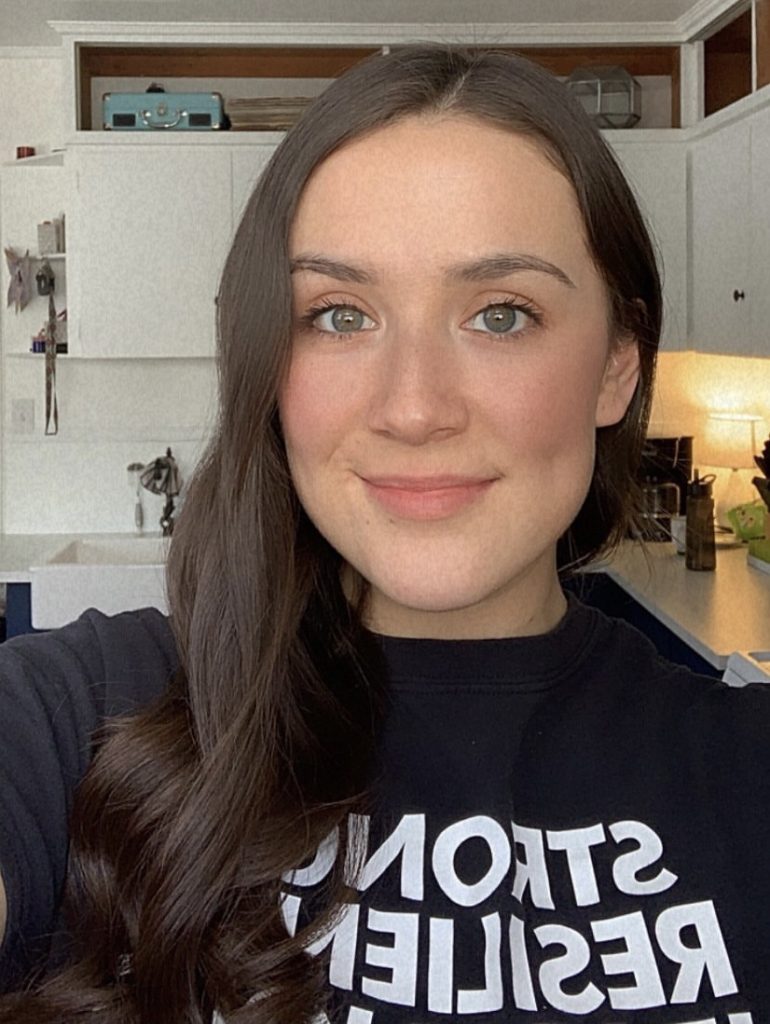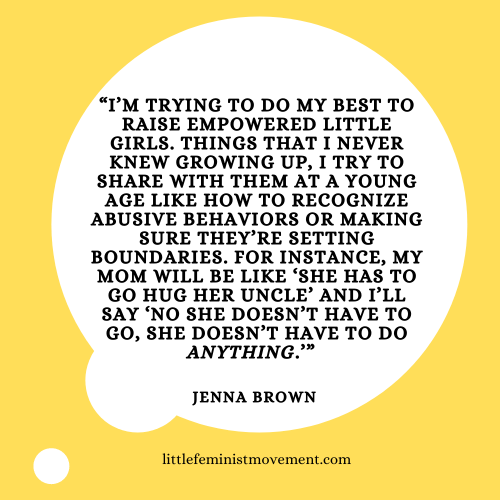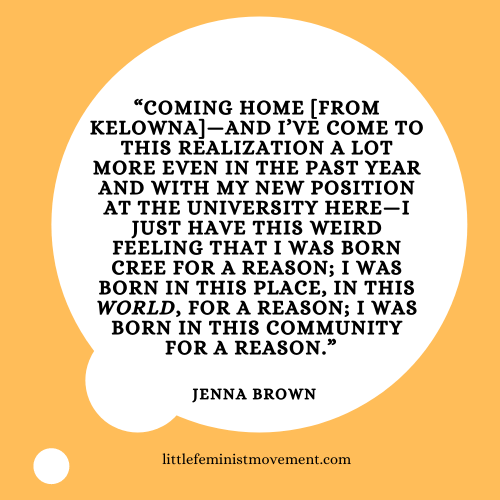A Conversation with Jenna Brown
My phone lights up with a notification that I’ve been tagged in an Instagram story.
When I open the application and look at the story, it’s an image of a Zoom waiting room and it’s captioned: “Get to hang with one of my besties for a bit [insert sobbing emoji] [insert heart emoji].”
Hopping onto the Zoom call, I’m met by a woman who appears to be laughing. When I ask her what she’s laughing about, she responds with “I’m not laughing. I’m crying!”
It’s been around five years since Jenna and I have talked face-to-face (or virtual-face-to-virtual-face), but nothing has changed in the way we converse.

We’re still silly; we’re still serious; we’re still comfortable; and we’re still willing and eager to listen to one another.
Since we last saw each other, the biggest change in Jenna’s life has been becoming a mother. She says “every time I talk somewhere or when I’m in meetings, I always say I’m a mother, that’s the first thing I say.” Motherhood is the “most sacred role” in Jenna’s life, so, of course that’s where I’m going to start with my introduction of Jenna Brown: she’s a mom.
I’ve been good friends with Jenna for eight years now—roommates for two of those years while we were going to university in Kelowna—and motherhood is something she always talked about and wanted for herself. Now that she is a mother, she says “I love being a mom. It’s the best thing in the world,” but also acknowledges that “it’s really hard.”
According to Jenna, one of the most challenging parts of being a mother to two young girls is trying to guide them, but also empower them, at the same time: “I’m trying to do my best to raise empowered little girls. Things that I never knew growing up, I try to share with them at a young age like how to recognize abusive behaviors or making sure they’re setting boundaries. For instance, my mom will be like ‘she has to go hug her uncle’ and I’ll say ‘no she doesn’t have to go, she doesn’t have to do anything.’ I’m trying really hard to make sure that they feel strong enough to stand up for themselves, to tell people when they’re uncomfortable, to tell people when they don’t like something, and just making sure people are respecting that.” She concludes by insisting that she “just wants them to be as liberated as possible.”
Although there are obviously challenges when it comes to raising children, Jenna tends to focus on the joys that come along with motherhood: “My kids teach me so much. They’re really better humans than any adults.” While telling me about her eldest daughter, she says “I could lose my patience and yell at her and then feel so bad, but she’ll forgive me like that without even a second thought.” Jenna admits that her eldest daughter has even taught her how to practice forgiveness and resist holding grudges in her personal relationships, as well.

In addition to her children and partner playing a large role in her life, Jenna also places emphasis upon the role that her community played in shaping her identity. She grew up in Manitoba in the divided community of The Pas and Opaskwayak Cree Nation (OCN)—the community is literally divided by the Saskatchewan River—and she strongly believes that “community is really important” and “not just family.” She explains: “I’m a part of a bigger community here. Everyone knows everyone and it’s not a bad thing. Staying in your community and staying on the rez and helping is powerful. You’re not seen as being unsuccessful if you don’t leave, but I want to stay and make it better; not leave and try and be this thing, success. I want to make this success. I want everyone to be healthy and healing.”
Jenna goes on to say that, although there is a lot of “trauma” and “hurt” around her and the community in which she lives, she believes that it is exactly where she’s supposed to be: “Coming home [from Kelowna]—and I’ve come to this realization a lot more even in the past year and with my new position at the university here—I just have this weird feeling that I was born Cree for a reason; I was born in this place, in this world, for a reason; I was born in this community for a reason.”
Even while discussing her current position as a Project Case Manager for a hands-on IT program aimed at “fill[ing] the gaps and barriers that prevent Northern Indigenous women from obtaining careers in IT,” Jenna still focuses on the community aspect of the program. She is proud of the “community of women” that came together and lifted each other up through the program, as well as the fact that she aided in building “a space where everyone feels safe.”
I jokingly ask Jenna if she would ever move back to Kelowna, but her family and her community are not here, so I already know the answer: “I don’t know if I’d be happy if I was in a city without my family.”
We talk a bit about our time spent together in Kelowna. Jenna says “that was so hard, that part of my life. And I feel so bad. I feel like a tornado aura was brought with me there.”
I didn’t realize it while we were roommates, but Jenna tells me that she was having a very difficult time dealing with depression those years, particularly the second year we lived together: “I would always tell myself that I was actively just trying to ruin my life and I had this idea of train-wrecking my life. That’s what I wanted to do. I was just so destructive. I was in that mindset ‘well, if one thing goes wrong, then everything is going to go wrong and I’m going to be in control of making sure everything goes wrong.”
Following in the quick-to-forgive footsteps of her eldest daughter, Jenna simply says “I had to forgive myself for who I was. I look back and I just want to give that girl a hug.” She urges others to do the same and “not to be hard on yourself” because “all of us are just learning and growing, and that’s the point of life, to just hopefully be a better person, to learn along the way, and to be open to learning.”
The depressive episodes have not ceased entirely, either. Jenna reveals: “It’s something that comes in and out of my life, and the more I learn about it, the more I recognize it at different stages of my life.” She also recently began recognizing symptoms of anxiety in herself: “Anxiety is a new one, like, holy man, I have really bad anxiety. A lot of the things I’ve done my whole life are because of anxiety.”

Jenna tells me that she is not quite sure how she made it through that period of depression in Kelowna. However, she does offer some insight into how she is currently dealing with depression and anxiety, and some advice to others regarding how they might cope with mental health issues, as well: “Read about it. Learn about it. Learn to recognize it. Learn when you are in it.”
When our conversation is over and I shut my laptop, I find myself thinking about the conversations that we had years ago while we were attending university in Kelowna. Just like Jenna said she felt bad for bringing that tornado aura with her to Kelowna, I feel bad for failing to recognize that she was hurting so much at that time.
I’ll take a page out of Jenna’s book, though, and not be too hard on myself.
Maybe I’ll rip a page out of her eldest daughter’s book, too, and just forgive myself. I’m sure—with a mother like Jenna—I’ll be ripping out plenty more pages from that empowered little girl’s book.
And, I mean, just wait until Jenna’s second daughter gets a bit bigger…